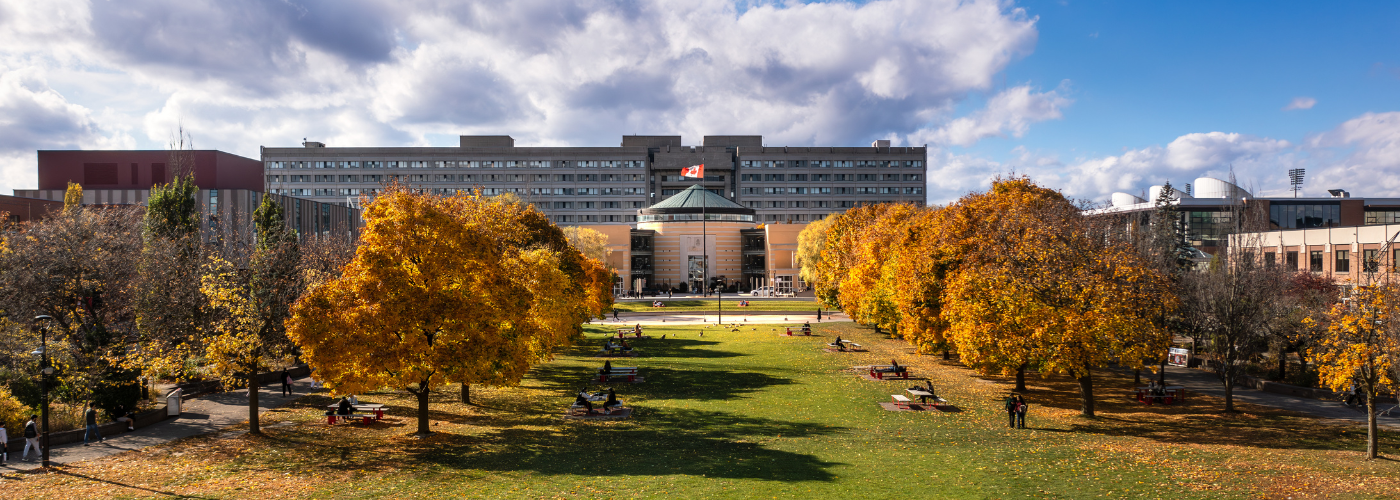
York University launches sustainability strategy to address humanity’s code red climate crisis
As the world heats up, creating extreme weather havoc, the University is on track to reach the 2030 Paris Agreement 45 per cent emissions reduction target years earlier
Many scientists now believe global temperatures are on track to surpass 1.5C and are likely to reach 2.5C, or greater, above pre-industrial levels. At the same time, reports peg many corporations as quietly quitting their reduced carbon commitments. York University, on the other hand, stands out as a beacon to a more sustainable future.
The University continues to advance sustainability through teaching, research, more efficient campus operations and community involvement, locally and beyond, toward a better, greener world in line with its motto “Tentanda via – the way must be tried”.
Launched today, its newly revised Sustainability Strategy 2030, Positive Change: Connecting People, Planet and Purpose outlines what steps York will take towards meeting its sustainability goals. Its new sustainability objectives will propel York forward on a path to becoming one of the most sustainable institutions in Canada.

“As a global community, we are at an inflection point for the climate crisis. While the Earth’s climate system continues to worsen, there is still time to change course, and is up to us all to take action,” says Rhonda Lenton, York University president and vice-chancellor. “With this new strategy, developed through consultations with the York community, we will escalate our efforts to combat the climate crisis through a whole-of-university approach that includes teaching, research, partnership, and operational activities across our local and global campuses. Together, we can realize a more sustainable future for ourselves and for our planet.”
As a living document, the strategy will guide York’s bolstered commitment while answering a call to action towards sustainability. One of its top goals after hitting its 2030 target, potentially years earlier than expected, is to plan to phase out carbon emissions to achieve net zero by 2040 for scope one and two emissions and develop targets for scope three emissions. York will work to design all new buildings, and any major renovations, to net zero with an aim to make them net positive. In working towards also becoming a zero-waste institution, goals include reducing water use on campus, protecting watersheds while optimizing stormwater repurposing, mitigating the ecological impact of food eaten on campus, and regenerating local ecosystems.
It all starts with the will to do more and the plans to carry it out, while striving to make a difference locally and globally. That includes plans to maximize building use, the heating and cooling of spaces, and a strategy to decarbonize central utilities and fleet vehicles.
“York University has a history of leading on sustainability in our teaching, research, and operations,” says Mike Layton, chief sustainability officer in York’s Office of Sustainability. “York University is well positioned with a global reputation as a leader in sustainability and as a university that does more than educate and research – York trains a community of changemakers.”
The plans are already paying off. Earlier this year, the University developed a new pollinator garden at its Keele Campus, part of its re-naturalizationand ecological regenerationplans which prioritize Indigenous plants. Part of its overall plan for success is to engage not only the university community, but also the wider community in its green strategies. The new pollinator garden is an example as visitors can scan QR codes placed throughout the garden to bring pollinators to life using augmented reality.

This fall, York put its new fleet of all electric shuttle buses on the road ferrying students and faculty between campuses emissions free. There are newly installed solar panels ready to be activated and several flourishing green roofs, including at its newer Second Student Centre. In addition, the University is exploring ways to use heat from underground sewers to warm and cool its Glendon Campus.
Part of achieving the necessary action to ensure a more sustainable future is through research and education, a key to transforming societies. York sees sustainability as a core value in all its teaching and research, as well as its campus operations. Under it’s three pillars of people, knowledge and place, the University strives to be a catalyst for climate action and solutions, an incubator for sustainability leaders, a disrupter of old ways of thinking, and a lodestar for transformative approaches.
A history of sustainability long before it was fashionable
The University has a long, steady history of sustainability. In 1968, it started the first Faculty of Environmental Studies in the country, along with the first known recycling program. Since then, it has continually reduced its greenhouse gas emissions (GHG). Through improvements in 1990, it reduced its GHG emissions by about 17,000 tonnes, plus another 11,000 tonnes in 2000, and 4,000 in 2010. Altogether, in its quest to be more energy efficient and build more sustainable buildings, York has diverted some 700,000 tonnes of GHG emissions in just over two decades.
In 2015, York phased out the sale of single use plastic water bottles, installed 70 water refill stations across its Keele and Glendon campuses and retrofitted over 200 existing public water fountains. In 2020, the Office of Sustainability was launched and two years later it was announced that efforts were underway to achieve net-zero sooner.
A living document for a changing planet
The new sustainability strategy works together with other institutional documents and commitments that touch on its vision, guiding principles, strategic objectives, and actions. As a living document, measurable and interim targets will roll out as the plan is implemented. Although its focus is on the environment, how it intersects with social and economic factors is also an important component of York’s strategy.
By mobilizing students, faculty, staff, alumni and the external community, York hopes to shine a green light of hope along the path to climate action, positive change and a sustainable future for all.






